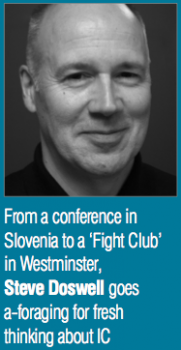
MEANING WHAT YOU SAY
Steve Doswell says, “Meaning is precious and so is integrity. We should be careful to use language that conveys the one and upholds the other”
 As another summer peaks, I’ve been gathering fresh food for thought about this hybrid practice we call internal communication. I returned once again to BledCom, now part of my annual summer rhythm. Held in Slovenia, BledCom is an annual get-together for the global academic community that has made public relations and organisational communication its chosen field. BledCom’s symposium format bookends a series of short research presentations (maximum 12 minutes and don’t even think of going over time because if you do you will be eaten) with keynote speakers drawn from the world of practice. Actually, the academic-practitioner distinction is pretty fluid in this field because many of today’s established academics have also been accomplished practitioners.
As another summer peaks, I’ve been gathering fresh food for thought about this hybrid practice we call internal communication. I returned once again to BledCom, now part of my annual summer rhythm. Held in Slovenia, BledCom is an annual get-together for the global academic community that has made public relations and organisational communication its chosen field. BledCom’s symposium format bookends a series of short research presentations (maximum 12 minutes and don’t even think of going over time because if you do you will be eaten) with keynote speakers drawn from the world of practice. Actually, the academic-practitioner distinction is pretty fluid in this field because many of today’s established academics have also been accomplished practitioners.
As always, there was plenty to pique the palate of IC practitioners looking for morsels to take home. One highlight for me was associate professor Shannon Bowen’s study from the University of South Carolina that looked at the corporate use of the language of ethics. The study cited many of the words to be found in what might be called the dictionary of corporate ethics, for example: genuine, values, transparent, integrity, character. Such terms are now used liberally in organisational texts and discourse and their meaning is often blurred. At this point some people will smile wryly and observe that the blurring provides a useful smokescreen, masking corporate realities that may be at odds with the wishfulness of the more high- minded language used. The research was fascinating and a reminder of how easy it is for meaning to slip until it’s effectively out of reach unless we apply the utmost rigour to our choice of language. That’s a lesson that extends beyond the vocabulary of ethics. Not every piece of ‘insight’ is necessarily insightful or deserves to be categorised as a ‘white paper.’ Meaning is precious and so is integrity. We should be careful to use language that conveys the one and upholds the other.
I was recently invited to an event billed as an IC ‘fight club,’ hosted by Liam Fitzpatrick at Ellwood Atfield’s Communications Gallery with support from Question & Retain. My expectation was of a ‘home truths’ discussion where people could air what they really feel about IC but were normally reluctant to share openly. It was a bit like that, although the British bias towards politeness as a factory setting meant that there would not be blood.
Three of the most passionately held positions were: IC as a practice isn’t strategic enough; we’re still too siloed in our thinking; and we don’t like HR much. My own views are: I probably agree with the strategic (or, in this case, non-strategic) point, although as a professional discipline, we’re on a journey towards the light and the trend is positive; we’re in an envious position to skip between the silos because of the cross-business nature of IC, but we always have been in this position and it’s high time we found the courage, language and organisational nous to think, speak and act in a truly cross-functional way; and because of the second point, we have a professional duty (I was going to say ‘moral duty’ but then I remembered Bowen’s call for rigour around the language of ethics) to build and sustain productive relationships with our HR colleagues. I did attempt to voice that last point during the fight club session but it clearly wasn’t a popular view in that particular crowd. Popular or not, though, HR and IC are in a relationship. And it needs to work. We’ll be returning to this topic soon.
Steve Doswell is chief executive of the Institute of Internal Communication



